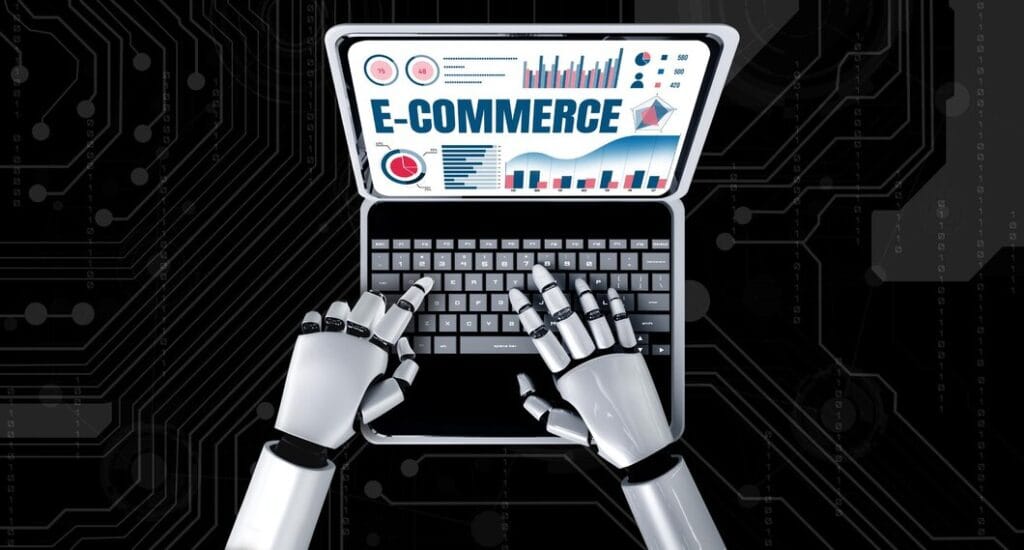The use of artificial intelligence (AI) in e-commerce has transformed the way things are done by improving the interactions between customers and businesses, improving the general operations, and increasing sales. In this guide, we analyze the effects of AI on e-commerce and, in particular, the major trends and practices that businesses can learn.
The Rise of Artificial Intelligence in E-commerce
Within e-commerce, different aspects are incorporating technologies such as machine learning, communication language processing, and image processing. These technologies help in understanding customer behavior, enabling businesses to automate processes, and ensuring that customers are always engaged.
AI-Powered Personalization
Artificial intelligence Neural networks examine the customer data to provide product recommendations, product emails, and marketing messages accordingly. This has a positive impact on customer satisfaction as well as conversion rates by making sure that products and content relevant to the shopper are available.
Chatbots and Virtual Assistants
With the help of AI, chatbots and virtual assistants provide round-the-clock assistance to customers, help them make purchases, and address their concerns. Such service is referred to as customer service with instant response capabilities. Responding instantly reduces the waiting period for customer service and allows an agent to respond to more than one customer at a time.
AI in Search and Discovery

Thanks to artificial intelligence, search performance improves as it interprets complex language and gives out relevant results. The implementation of image recognition technology also enables users to look for items by photos provided, thus making it easier for the shoppers.
Inventory and Supply Chain Optimization
By predicting demand, automating transcription of orders to the distribution center, and minimizing waste within the supply chain, artificial intelligence is very effective in optimizing inventory management and supply chain systems. This makes sure that there are products whenever a customer would like them and also makes it more effective in terms of operations.
Pricing Optimization
AI evaluations take into account the current state of the market, the pricing of rivals, and the purchasing patterns of consumers in order to determine the appropriate rates. AI-facilitated dynamic pricing strategies ensure that prices remain competitive while maximizing profit.
Fraud Detection and Security
To mitigate losses incurred from frauds, companies use AI technologies to monitor behaviors by studying transaction patterns and detecting any deviations. This increases security for businesses as well as customers, minimizing incidences of fraud.
AI in customer reviews and sentiment analysis
AI systems assess client reviews and feedback to determine the sentiment and help discover areas that need improving. In this way, organizations comprehend different views of clients and base their decisions on the need to improve the quality of what they offer.
Visual and Voice Search Technology
Technologies such as visual and voice searches, which are driven by artificial intelligence, allow customers to search for products based on images and voice commands, respectively. This enhances the shopping experience as it caters to customers who prefer other ways of searching.
AI for Product Recommendations
Customers’ viewings and buying behaviors are the basis of products suggested by AI-based recommendation systems. Such recommendations are very personalized, which further enhances sales and loyalty to the customers.
AI in Marketing Automation
Marketing Business Analysis Chatbot AI technology carries out certain marketing activities. For example, sending out emails, posting on social networks, and targeting ads, whereas in business processes productivity is boosted as well as more focused and efficient marketing messages are issued.
The Role of AI in Augmented Reality (AR) Shopping

The application of AI in AR shopping experience frequencies offers virtual experience fittings and product imagery. AR customer features enable customer products to be visualized or worn, which minimizes return rates.
Challenges in AI Implementation for E-commerce
In the realm of e-commerce, AI has its advantages, yet it comes with a cost, especially the implementation aspects, which include the cost associated with it, concerns about data privacy, as well as the technical skills. These and any other challenges must be solved in order for the businesses to take full advantage of AI.
Future Trends of AI in E-commerce
What lies ahead in the future includes the ambience of AI-powered IoT technology, superior predictive analytics, and even better virtual assistants. All of these will serve to improve the e-commerce experience and foster innovation.
Conclusion
A positive disruption in e-commerce has been brought about by AI through effective customization of offerings, streamlining processes, and enhancing the overall experience of the customers. Enterprises willing to integrate artificial intelligence into their processes are able to remain relevant to the ever-changing demands of their customers.
FAQs
How does AI improve customer experience in e-commerce?
AI improves the customer experience by providing personalized recommendations, instant customer support, and intuitive search functionalities.
What are the benefits of AI-powered chatbots in e-commerce?
AI-powered chatbots offer 24/7 customer support, handle multiple queries simultaneously, and provide instant responses, improving customer satisfaction.
How does AI help in inventory management?
AI predicts demand, automates restocking, and optimizes inventory levels, ensuring products are available when needed and reducing waste.
What is dynamic pricing, and how does AI enable it?
Dynamic pricing adjusts prices based on market trends, competitor pricing, and customer behavior. AI analyzes these factors to set optimal prices in real-time.
What are the challenges of implementing AI in e-commerce?
Challenges include high costs, data privacy concerns, and the need for technical expertise. Businesses must overcome these to fully benefit from AI.
How will AI in e-commerce evolve in the future?
Future trends include integration with IoT, advanced predictive analytics, and more sophisticated virtual assistants, further enhancing the e-commerce experience.






